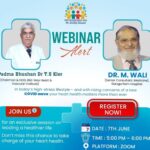- Last week saw the first decline in newly-reported cases globally since September. This is no time for complacency, especially with the holiday season approaching in many cultures and countries.
- The COVID-19 pandemic will change the way we celebrate, but it doesn’t mean we can’t celebrate. The changes you make will depend on where you live. Always follow your local or national guidelines.
- Tomorrow is World AIDS Day. New HIV infections have declined by 23% since 2010, and AIDS-related deaths have fallen by 39%.
- A record 26 million people are on antiretroviral treatment – but the pace of increase has slowed, and that leaves 12 million people who are living with HIV but are not on treatment. That gap is jeopardising our goal of ending AIDS as a public health threat by 2030.
India
healthysoch
New Delhi, December 01, 2020 :
Good morning, good afternoon and good evening.
Last week saw the first decline in newly-reported cases globally since September, due to a decrease in cases in Europe thanks to the effectiveness of difficult but necessary measures put in place in recent weeks.
This is welcome news, but it must be interpreted with extreme caution. Gains can easily be lost, and there was still an increase in cases in most other regions of the world, and an increase in deaths.
This is no time for complacency, especially with the holiday season approaching in many cultures and countries. We all want to be together with the people we love during festive periods.
But being with family and friends is not worth putting them or yourself at risk. We all need to consider whose life we might be gambling with in the decisions we make. The COVID-19 pandemic will change the way we celebrate, but it doesn’t mean we can’t celebrate. We still can celebrate.
The changes you make will depend on where you live. Always follow your local or national guidelines. The first question to ask yourself is, do you need to travel? Do you really need to travel.
For many people, this is a season for staying home and staying safe. Celebrate with your household, and avoid gatherings with many different households and families coming together.
If you do meet people from a different household, meet outdoors if you can, maintain physical distance and wear a mask. Avoid crowded shopping centres, shop at less crowded times, and use online shopping if you can.
If travelling is essential, take precautions to minimize the risk – for you and others. Maintain distance from others and wear a mask when you’re in airports and train stations, and on planes, trains and buses. Carry hand sanitiser with you, or wash your hands frequently with soap and water.
And if you feel unwell, don’t travel. Even if we can’t celebrate as normal this year, make a plan to celebrate with your family and friends once it’s safe to do so. We know it will be safe, it’s a matter of time. The pandemic will end – and we all have a part to play in ending it. And we must remember that for millions of people, COVID-19 is only one health threat they face on a daily basis.
Tomorrow ie on December 01, is World AIDS Day. The world has made incredible progress on HIV-AIDS over the past 10 years. New HIV infections have declined by 23% since 2010, and AIDS-related deaths have fallen by 39%.
A record 26 million people are on antiretroviral treatment – but the pace of increase has slowed, and that leaves 12 million people who are living with HIV but are not on treatment. 12 million is big. That gap is jeopardising our goal of ending AIDS as a public health threat by 2030.
COVID-19 has had a profound effect on people living with HIV, as it has for many diseases. There is some evidence that people living with HIV may have an increased risk of severe disease and death from COVID-19.
This increased risk has been compounded by disruptions to treatment for people living with HIV. In a WHO survey of 127 countries earlier this year, more than a quarter reported partial disruption to antiretroviral treatment for people with HIV.
However, with support from WHO and the work of health and community workers, the number of countries reporting disruptions in HIV services has declined by almost 75% since June. This is good news. Only 9 countries are still reporting disruptions and only 12 report a critically low stock of antiretroviral medicines.
This is mainly due to countries implementing WHO guidelines, including providing longer prescriptions of antiretrovirals for 3 to 6 months, so patients can avoid health facilities.
WHO has also worked closely with manufacturers and partners to ensure adequate supply of treatment. Countries have also introduced a number of effective adaptations and innovations during COVID-19.
In Africa, many countries have built their testing system for COVID-19 on the existing lab infrastructure for HIV and TB. In Thailand, the government has maintained pre-exposure prophylaxis services and telehealth counselling for men who have sex with men.
And many countries have introduced more self-testing for HIV to support self-care and avoid the need for people to visit clinics or hospitals. WHO is urging countries to maintain these innovations as part of the “new normal”, and to help expand testing and treatment to people who need it.
But if the pandemic has taught us anything, it’s that in the face of an urgent health threat, the world can come together in new ways to defeat it.
For many people, the pandemic is a source of fear – but it can also be a source of hope that we can defeat COVID-19, and we can defeat HIV. There is a lot of hope, especially with the advent of the vaccines that have been announced in the last few weeks.
From WHO’s side we’re sure we can defeat the pandemic using existing tools and the vaccines that are in the pipeline. The most important thing is we need to have hope, and not only hope but solidarity to work together.
Thank you.
healthysoch






